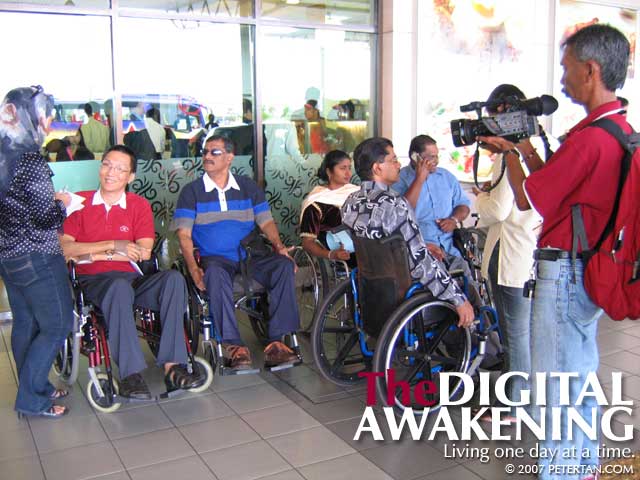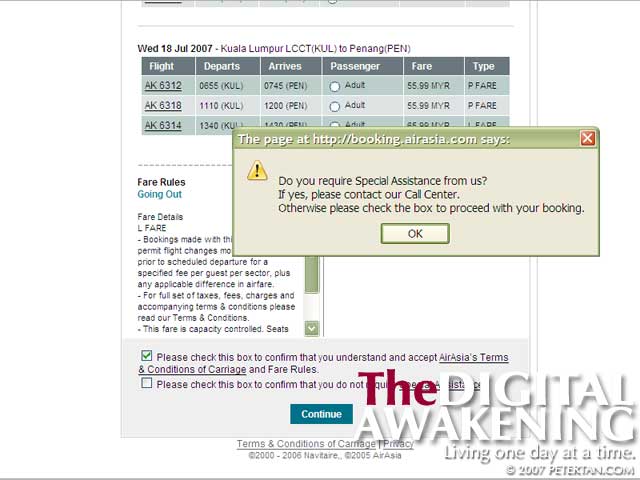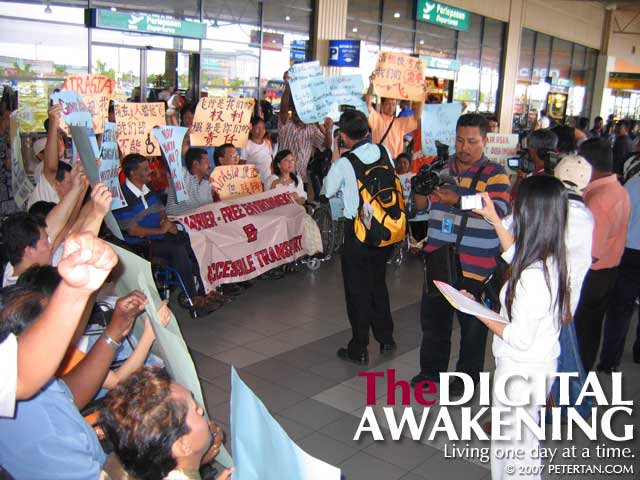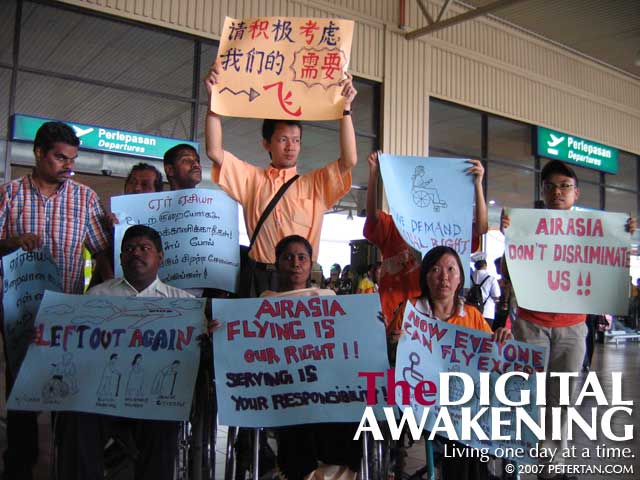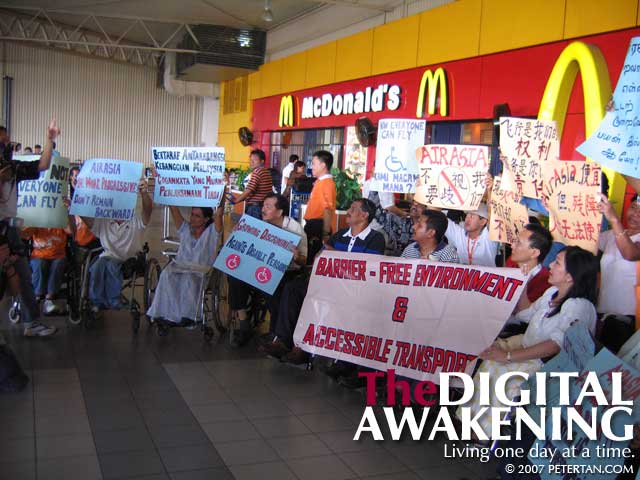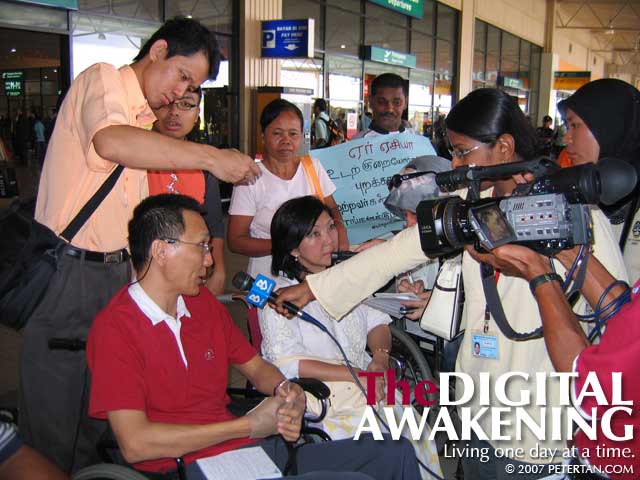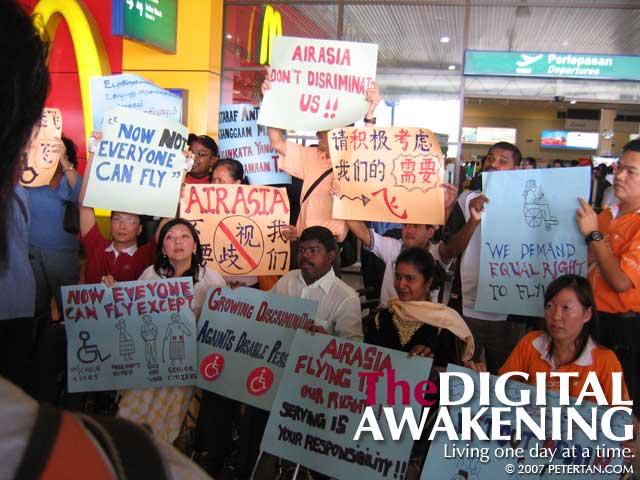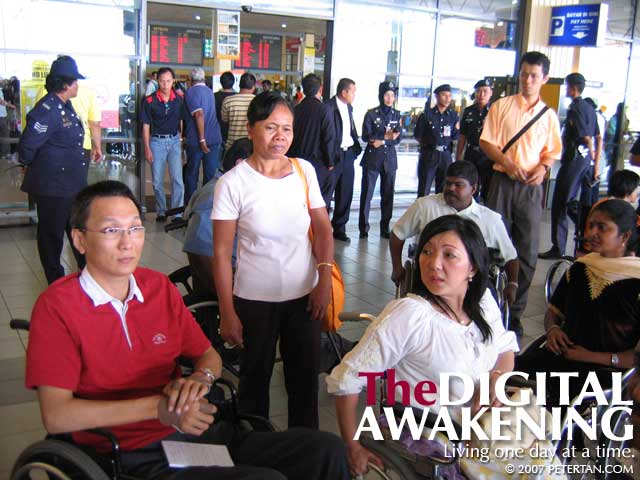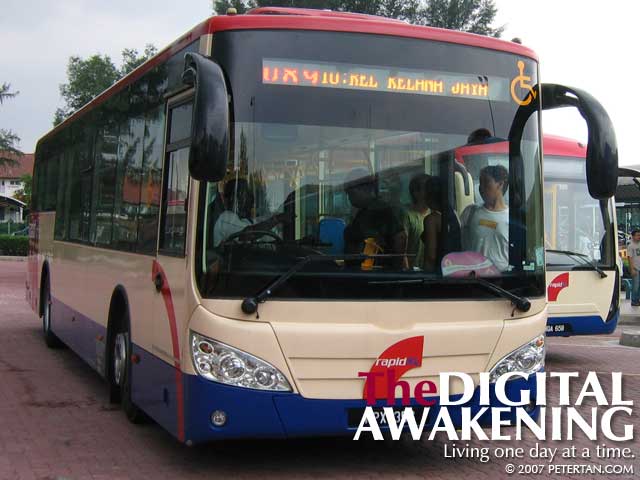DATE : 15TH JULY, 2007, SUNDAY, 11 AM AT LCCT
PRESS STATEMENTS ON AIRASIA’S REFUSAL TO TAKE PASSENGERS WHO REQUIRE SPECIAL ASSISTANCE TO BOARD AIRCRAFT.
We, members of Barrier-free Environment and Accessible Transport Group ( BEAT), are gathered here this morning, to express our outrage and disappointment with AirAsia, for its refusal to take passengers who require special assistance to board the aircraft.
In AirAsia’s Terms and Conditions, it states :-
1. AirAsia is unable to accept passengers who are completely immobile
2. As access to our aircraft is by the boarding stairs, the carriage of persons with limited mobility is subject to whether they are able to climb the boarding stairs unaided or aided.
3. A passenger who is able to walk up the boarding steps unaided may travel without a carer.
4. If the passenger is unable to climb the boarding stairs without any assistance, then AirAsia will request that the passenger travels with a carer.We find AirAsia’s terms and conditions blatantly discriminating, unfair and unacceptable !! A check with AirAsia Call Centre confirms that only those who DO NOT require special assistance to climb the boarding stairs are allowed to travel in AirAsia. These terms and conditions have denied disabled passengers and persons with limited mobility, their right to fly like everyone else !! These terms and conditions imposed by AirAsia has caused further inconvenience and hardship to them.
The freedom to fly should be applicable to EVERYONE including passengers who are immobile and persons with limited mobility who may travel unaccompanied but require assistance to go onboard the aircraft.
AirAsia, Asia’s leading and largest low fare airline, has failed to live up to its slogan “Now Everyone Can Fly”. It is obvious that “ Now Not Everyone Can Fly” and “ Now Not Everyone Is Allowed To Fly in AirAsia”.
AirAsia has failed in its responsibility and obligation to provide facilities and services without discrimination, harrassment and vilification of its passengers.
We are here to reaffirm our commitment to fight any form of discrimination against disabled persons !! Discrimination against any person on the basis of one’s physical condition is a violation of the inherent dignity and worth of the human person.
We are here to demand that AirAsia reviews its policies and takes reasonable steps to ensure that the facilities and services provided and the terms on which they are provided are non discriminatory !!
The provision of such facilities not only benefit disabled passengers but also senior citizens and international tourists who are wheelchair users and their family members who may choose Malaysia as their holiday destination. Besides this, it also further enhance the corporate image of AirAsia and tourism industry of Malaysia.
We also call on Malaysia Airports Berhad to make sure that all new and old airports be equipped with facilities to improve accessibility to disabled passengers.
We are deeply concerned that despite assurances from relevant authorities and Ministers, disabled persons continue to face barriers and discrimination in their everyday life.
Come this 31st August, Malaysians from all walks of life will be celebrating our country’s 50th year of independence. But disabled persons here are still struggling to understand and experience the meaning of independence.
We have internationally well known mega development projects called Southern Corridors, Northern Corridors, Eastern Corridors, etc, etc, but disabled persons are still struggling to get out of their house corridors !!
We have RapidKL which has launched 1200 new buses on the roads but none of these are accessible buses. Despite our appeals, Prasarana, a 100% government owned company, continues to purchase and launch non-accessible buses ! We have newly launched taxis which cannot take wheelchair passengers due to limited booth space filled with gas tank !
We have light rail transit system called STAR Line or Ampang Line and Monorail but are completely inaccessible ! Now, we have AirAsia, which has done the nation proud by being the fastest growing and largest low fare airline in the region, refusing to take passengers who are immobile requiring assistance to go onboard !
We call upon YAB Dato Seri Abdullah Ahmad Badawi, as Prime Minister of Malaysia, to hear our cries and consider our pleas for full inclusion in the overall Masterplan and Masterpolicy of the country. We ask to be treated with the same dignity and respect as equal members of society and full citizens of the country.
We also urge our Prime Minister to review the proposed Disabled Persons Act and to endorse the “ UN Convention on the Rights of Persons with Disabilities” to protect and guarantee disabled persons the same rights as other persons and to eliminate all forms of discrimination against them.
Thank you.
Christine Lee
BEAT CoordinatorV. Murugeswaran
BEAT Assistant CoordinatorPeter Tan
BEAT Assistant CoordinatorBarrier-Free Environment and Accessible Transport Group (BEAT) comprises 18 Organisations as listed below :-
• Persatuan Damai Orang-Orang Kurang Upaya Selangor & W.P
• Malaysian Spinal Injuries Association
• Persatuan Mobiliti Selangor & Kuala Lumpur
• Persatuan Orang-Orang Cacat Anggota Malaysia
• Society of the Blind in Malaysia
• Malaysian Association for the Blind
• Society of the Chinese Disabled Persons Malaysia
• Persatuan Kristian Shuang Fu untuk orang Kurang Upaya Kuala Lumpur
• Beautiful Gate Foundation for The Disabled
• Persatuan Pemulihan Orang Cacat Selangor & Wilayah Persekutuan
• Selangor Cheshire Home
• Malaysian Information Network on Disabilities
• Dignity & Services
• United Voice (Self-Advocacy Society of Persons with Learning Disabilities Selangor & Kuala Lumpur)
• Selangor Council for Welfare and Social Development
• Majlis Paralimpik Malaysia
• Malaysian Council For Rehabilitation
• Lovely Home
Related entry:
Air Asia – Now Everyone Can Fly – Betulkah?

